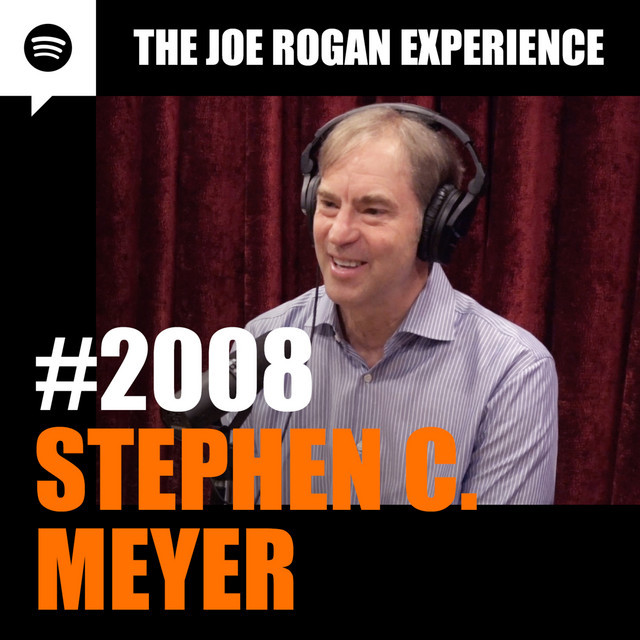13-Jul-23
This podcast explores the fascinating realm of intelligent design, a theory challenging traditional evolutionary explanations for the origin of life. Stephen C. Meyer, a renowned philosopher of science and author, presents his compelling case for a creator, sparking a captivating discussion with Joe Rogan about the origins of life, the limitations of materialism, and the nature of consciousness. Provocative topics include the complexities of DNA, the fine-tuning of the universe, and the philosophical underpinnings of belief. Underlying themes delve into the role of science in understanding our place in the universe, the limits of scientific explanation, and the enduring human quest for meaning.
1. From Personal Doubts to Philosophical Exploration:
Meyer’s journey towards intelligent design began with existential questioning as a teenager, a period marked by profound existential concerns.
He initially found solace in religion, seeking answers to fundamental questions of meaning and purpose.
His exploration led him to the study of physics, geology, and philosophy, shaping his intellectual framework.
A pivotal experience at a conference exposed him to the perceived shortcomings of materialism, sparking a deeper investigation into the evidence for a creator.
2. The Impasse of Evolutionary Explanations and the Mystery of Information:
Meyer highlights a central impasse in evolutionary explanations for the origin of life, questioning how life arose from non-life.
He emphasizes the critical role of information encoded in DNA, a digital code directing the construction of life’s building blocks.
The origin of this information, according to Meyer, poses a fundamental challenge to Darwinian evolutionary theory, highlighting the need for a different explanation.
Meyer’s own background in digital signal processing enhances his perspective on the nature of information and its implications for the origins of life.
3. The Argument from Epistemological Necessity and the Reliability of the Human Mind:
Meyer discusses the “argument from epistemological necessity,” a philosophical argument questioning the reliability of human perception and cognition.
This argument explores whether we can truly trust our minds to grasp the nature of reality, considering the limitations of our senses.
Meyer asserts that this fundamental question has led to postmodernism and skepticism about objective reality.
He suggests that belief in a creator provides a foundation for the reliability of human reasoning, offering an answer to the dilemma of epistemological necessity.
4. The Fine-Tuning of the Universe and the Anthropic Principle:
Meyer delves into the concept of the “fine-tuning of the universe,” observing that physical constants and laws seem perfectly calibrated for life.
He suggests that this fine-tuning points to the existence of a designer, rather than random chance.
The anthropic principle, which suggests that the universe must be fine-tuned because we are here to observe it, is discussed as a potential counterargument to the design argument.
Meyer argues that the improbability of the fine-tuning, even with the anthropic principle, strengthens the case for intelligent design.
5. The Case for Intelligent Design: Scientific and Philosophical Arguments:
Meyer elaborates on the scientific evidence for intelligent design, focusing on the complexities of biological systems, particularly the intricate nature of DNA.
He argues that the irreducibility of certain biological systems points to a designer, as their gradual evolution seems improbable.
Meyer presents philosophical arguments for design, drawing from the argument from epistemological necessity and the fine-tuning of the universe.
He challenges materialist explanations for the origin of life and consciousness, presenting intelligent design as a more compelling alternative.
6. The Nature of Consciousness and the Limits of Materialism:
Meyer examines the nature of human consciousness, proposing that materialist explanations fail to fully account for its subjective nature.
He suggests that consciousness may be a product of a non-material reality, a concept aligned with the idea of a creator.
The limitations of artificial intelligence, according to Meyer, underscore the difficulty of fully replicating consciousness through purely material means.
He suggests that the existence of consciousness points to a deeper reality beyond the purely physical world.
7. The Role of Science in Understanding Our Place in the Universe:
Meyer discusses the role of science in understanding our place in the universe, acknowledging the immense power of scientific investigation.
However, he emphasizes the limitations of science in explaining ultimate origins and the nature of reality.
He posits that intelligent design complements scientific inquiry, offering a broader framework for comprehending the universe and our place within it.
Meyer suggests that science and intelligent design are not mutually exclusive, but rather complementary perspectives on the universe.
8. The Enduring Human Quest for Meaning:
Meyer emphasizes the inherent human desire for meaning and purpose, a fundamental question driving his own journey.
He suggests that intelligent design offers a framework for understanding meaning, linking it to the existence of a creator.
The pursuit of meaning, according to Meyer, is a central driving force for humanity, shaping our values, beliefs, and actions.
He posits that the exploration of meaning can lead to a deeper understanding of ourselves and our place in the universe.
5 Memorable Quotes:
- “The thing that really convinced me as a university student… studying philosophy was an argument known as the argument from epistemological necessity.”
- “The fundamental question in modern philosophy… that has really just been a stumper and has led to this whole postmodern turn is the question of the reliability of the human mind.”
- “We have to use those assumptions in order to know anything at all.” – Meyer on the limitations of human reasoning and the need for foundational assumptions.
- “The universe is not only fine-tuned for life… it’s fine-tuned for a very specific kind of life, our kind of life.” – Meyer highlighting the extraordinary specificity of the fine-tuning argument.
- “If there is a code, there has to be a coder. If there is information, there has to be an information source.” – Meyer emphasizing the fundamental connection between information and intelligence.
